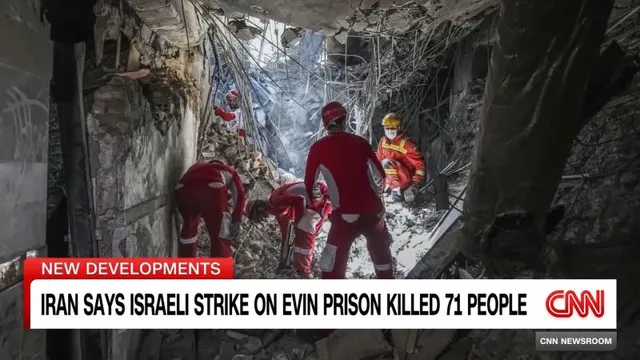
Israeli strike on Evin Prison kills more than 70 people
2025-06-30 07:59- The recent Israeli strike on Evin Prison resulted in at least 71 fatalities, including prison staff and visiting family members.
- Iran's judiciary spokesperson confirmed the attack led to substantial damage and casualties from various groups associated with the prison.
- This incident highlights ongoing tensions between Israel and Iran, with significant implications for the safety of political prisoners and regional stability.
Express your sentiment!
Insights
In Iran, an Israeli military strike targeted the heavily fortified Evin Prison in Tehran on June 23, resulting in significant casualties and damage. This attack killed at least 71 individuals, including prison staff, soldiers, inmates, visiting family members, and civilians living nearby. Among the dead was Ali Ghanaatkar, a prominent Iranian prosecutor known for his role in prosecuting dissidents. The strike was part of a broader Israeli operation targeting several sites associated with Iran's military and nuclear capabilities. Reports indicate the prison is notorious for holding political prisoners and dissidents, raising questions about Israel's rationale for the attack. The Israeli Defense Ministry stated the operation aimed at regime targets and facilities involved in repression within Tehran. The international community has expressed concern over the strike, especially since it endangered the lives of two French nationals, Cecile Kohler and Jacques Paris, who were imprisoned there on espionage charges. These diplomats condemned the efforts and demanded accountability over the safety of their citizens. Iran's judiciary confirmed the attack and acknowledged the severe loss of life, claiming that many of the casualties were part of the prison administration and those visiting loved ones. Despite the significant claims of damage to Iran's nuclear capabilities from the strike, the precise state of its nuclear program remains uncertain. Rafael Grossi, head of the International Atomic Energy Agency (IAEA), commented on the damages caused, noting the ongoing ability of Iran to resume its nuclear activities if desired. This revelation indicates that while there may have been severe setbacks to the program, critical infrastructure and technical abilities likely remain intact. Therefore, Iran could potentially rebuild its nuclear capabilities rather quickly. The strike on Evin Prison not only highlights the ongoing tensions between Israel and Iran but also raises ethical questions regarding military operations targeting critical infrastructure that houses civilians. The implications of this attack could lead to further escalation of conflict in the region. Human rights organizations and international observers are likely to advocate for investigations into the circumstances surrounding the attack, particularly the high civilian death toll and the targeting of a prison known for human rights violations. As the situation develops, the international community will be closely monitoring Iran's response and any retaliatory measures from Israel or regional partners.
Contexts
The history of Evin Prison is deeply intertwined with human rights abuses that have garnered international condemnation over the decades. Established in 1972 in Tehran, Iran, as a facility to detain political prisoners, Evin Prison quickly gained notoriety for the severe violations of human rights that occurred within its walls. Initially designed as a correctional facility, it has transformed into a place of fear and repression, housing individuals who dissent against the Iranian government or are accused of political activism. Many inmates have faced brutal treatment, including torture, extrajudicial killings, and a lack of fair legal representation, highlighting the systemic abuses that have been allowed to perpetuate in this institution. Reports of solitary confinement and inhumane conditions further complicate the dire situation, contributing to a culture of silence and fear among its inmates and their families. Over the years, Evin Prison has played a significant role in the broader pattern of state-sanctioned human rights violations in Iran. Various human rights organizations, including Amnesty International and Human Rights Watch, have documented extensive accounts of abuses within the prison. Their reports describe the use of torture methods aimed at extracting confessions and the treatment of inmates during interrogations, raising urgent questions regarding the integrity of the Iranian judicial system. Political prisoners, journalists, and activists have all found themselves subjected to inhumane conditions, with many facing lengthy sentences based on politically motivated charges. This oppressive environment serves not only to punish dissent but also to instill fear in the population at large, effectively curtailing freedoms of expression and assembly. The international community has continuously called for accountability and reforms regarding the treatment of prisoners in Evin Prison. Despite the outcry, changes have been slow to emerge, as the Iranian government often pushes back against allegations of human rights violations. Over the years, it has repeatedly denied claims of torture and mistreatment, framing them as political propaganda aimed at undermining Iran's sovereignty. This denial exacerbates the suffering of current inmates and hampers any meaningful dialogue regarding human rights in the country. As a result, Evin Prison remains emblematic of the broader struggles faced by human rights activists in Iran, where the regime's grip on power is maintained through repression and fear. As the international community continues to observe the situation within Evin Prison, there remains a glimmer of hope for progress in human rights advocacy. Grassroots organizations and activists inside and outside of Iran are working tirelessly to bring attention to the plight of those detained without just cause. Awareness campaigns seek to educate the world about the harsh realities faced by inmates of Evin Prison, fostering international solidarity and encouraging further action against human rights abuses in Iran. While significant challenges remain, the persistence of advocacy and the unwavering commitment of human rights organizations serve as a vital lifeline for those suffering within the confines of Evin Prison, reinforcing the message that the fight for justice and human dignity must continue.